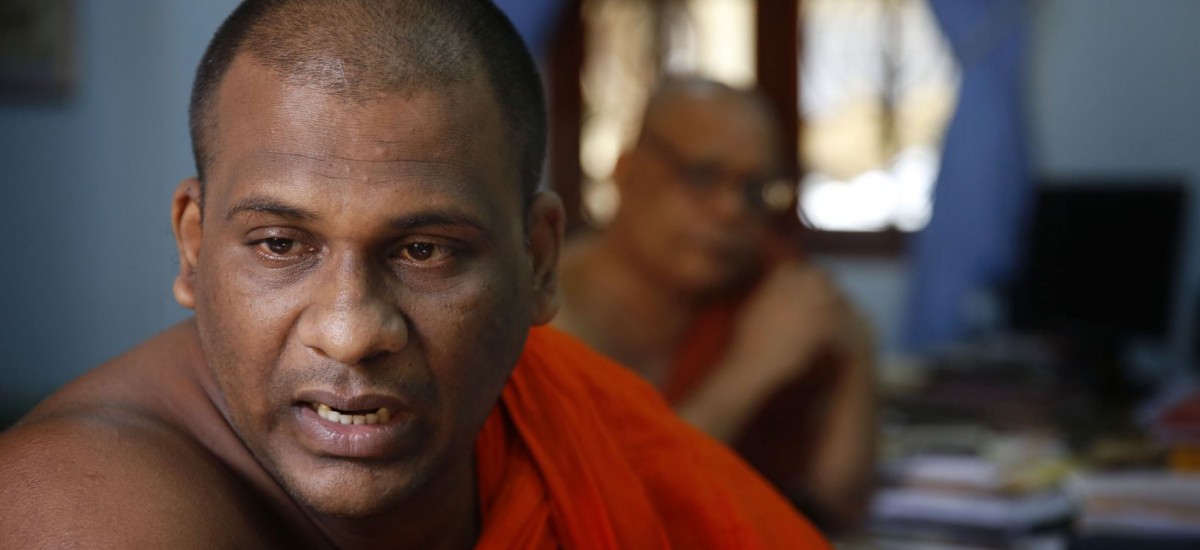Photo courtesy Today
There is a limit to tolerance, and this is it.
In its short history as an independent republic, Sri Lanka has seen more bloodshed than seems fair. Many of our citizens have been active participants in the bombing, burning, shooting, hacking and torturing of each other, and many more have supported this both actively and tacitly. And yet, without diminishing their culpability for these violent acts, it is necessary that we apportion even greater responsibility to those who led, commanded, instigated and provoked these. We cannot forget that the violent actions of the militants like Velupillai Prabaharan and Rohana Wijeweera set off processes that led to the deaths of tens and tens of thousands (on their sides and others). Nor that the actions of the likes of Cyril Matthew and inaction of J.R. Jayawardena contributed in equal part to this, through their orchestration of the riots of ’83. Other leaders bear responsibility for escalating and continuing the violence, but these individuals set the charges and lit the fuses.
Just like every act of communal violence in Sri Lanka’s history, the recent ‘riots’ in Aluthgama against Muslims were in no way spontaneous expressions of ethnic or religious grievance. Rather they were the inevitable outcome of an all too transparent process of scapegoating, grooming, incitement and instigation that has taken place over several years. Just as the groundwork for ‘Black July’ was laid by anti-Tamil rhetoric and lesser known violence in more rural areas of Sri Lanka, ‘Aluthgama’ has been a long time in the making. Incidents such as those in Anuradhapura, Dambulla, Dehiwela, Pavvakodichchenai, Wellampitiya, Sinha Hanuwa, Ridheegama, and Pepiliyana were dress-rehearsals for what was to come, and also allowed for testing of public tolerance of this violence and the refinement of the media propaganda that would justify it. The once-tiny groups like the Bodu Bala Sena and Sinhala Ravaya were able to swell the ranks of their cadres and supporters, with the help of political patrons who tacitly endorsed them, secretly bankrolled them or who simply looked the other way. In place of a crackdown and criminal charges, there has been a public spectacle of appeasement – of concessions and placations being offered to the aggressors to ask them nicely not to do it again.
This will simply not do anymore.
If the events of the past days signify anything, it is that the loony fringe of militant Buddhism is truly capable of plunging Sri Lanka back into a hell of civil ethnic (and religious) war. The leaders of this movement are truly without restraint or indeed reason – some of the noble qualities espoused by the teachings that they have utterly betrayed. They have no qualms about the consequences of what they do. The political and religious leaders of Sri Lanka now no longer exert control over these extremists – if they ever really did – and will soon be unable to put the genie back in the bottle. A new Buddhist and/or Muslim holy war is something that this country may never recover from, as there is no telling where or when it may end or how it will transform this island. What is certain is that no good could possibly come from this, for the Buddhists, Muslims, Hindus, Christians or atheists of Sri Lanka.
There has to be a limit. To tolerance of hate and the spread of this evil that threatens the current and future generations of Sri Lanka. There can be no more appeasement of the architects of religious violence. Those who are wilfully driving this country to the brink must be stopped.
- The key extremist groups like BBS and Sinhala Ravaya must be proscribed with immediate effect, under existing laws.
- Persons responsible for inciting or perpetrating hate crimes and communal violence must be arrested and charged to the full extent of the law.
- New laws to limit hate crimes and communal violence should be enacted and enforced.
- An inclusive process must be undertaken to secure the dignity and safety of every ethnic and religious group in Sri Lanka.
If this is not done, and done soon, there is a pretty good chance that within a few years either you or I will be mourning the completely unnecessary death of someone we love as a result of utterly meaningless ‘religious’ violence.
And this goes for the Rajapakses and the Mahanayakes too.

